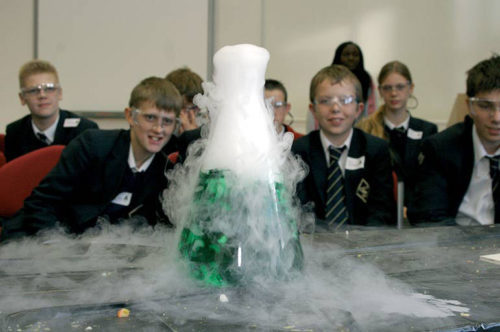Degree apprenticeships enable students to gain industry-relevant skills in the workplace. While there’s some on-campus training, the majority of staff development is provided through the employer, with course fees subsidised by government funding.
Our degree apprenticeship in chemistry explores organic chemistry, instrumental analysis and laboratory science. The course meets the Laboratory Scientist Standard and develops knowledge of chemistry and problem-solving skills that students can apply in the workplace.
The course is accredited by the Royal Society of Chemistry, indicating that students complete their studies with the essential knowledge needed to develop their professional roles.
What you should know about this course
Year 1
Students are required to study the following compulsory modules.
- Practical Laboratory Science Skills 1 (15 credits)
- Investigative Methodology 1 (15 credits)
- Inorganic Chemistry (15 credits)
- Organic Chemistry (15 credits)
- Physical Chemistry (15 credits)
- Professional Skills 1 – Chemistry Apprenticeships (15 credits)
Year 2
Students are required to study the following compulsory modules.
- Further Inorganic Chemistry (15 credits)
- Further Organic Chemistry (15 credits)
- Further Physical Chemistry (15 credits)
- Practical Laboratory Science Skills 2 (15 credits)
- Chemical Investigation (Apprenticeships) (15 credits)
- Professional Skills 2 – Chemistry Apprenticeships (15 credits)
Year 3
Students are required to study the following compulsory modules.
- Research and Professional Skills (15 credits)
- Intermediate Chemistry (30 credits)
- Instrumental Analysis (15 credits)
Year 4
Option Set 1
Students are required to choose 60 credits from this list of options.
- Advanced Organic Chemistry 1 (Stereochemistry and Mechanisms) (15 credits)
- Advanced Organic Chemistry 2 (Synthetic Organic Chemistry) (15 credits)
- Applied Physical Chemistry (15 credits)
- Advanced Spectroscopy, Thermodynamics and Quantum Mechanics (15 credits)
Option Set 2
Students are also required to choose 60 credits from this list of options.
- Advanced Inorganic Chemistry (15 credits)
- Advanced Inorganic Materials Analysis (15 credits)
- Chemometrics and Informatics (15 credits)
- Advanced Instrumental Analysis (15 credits)
Year 5
Option Set 1
Students are required to study the following compulsory modules.
- Project – Chemistry (30 credits)
Students are required to choose 30 credits from this list of options.
- Advanced Inorganic Chemistry (15 credits)
- Advanced Inorganic Materials Analysis (15 credits)
Option Set 2
Students are required to study the following compulsory modules.
- Project – Chemistry (30 credits)
Students are also required to choose 30 credits from this list of options.
- Advanced Organic Chemistry 1 (Stereochemistry and Mechanisms) (15 credits)
- Advanced Spectroscopy, Thermodynamics and Quantum Mechanics (15 credits)
Zobacz więcej na stronie uniwersytetu >>
Wiza studencka do Wielkiej Brytanii
Aby studiować w Wielkiej Brytanii potrzebujesz wizy studenckiej. Aby złożyć wniosek o taką wizę studencką musisz zdjać certyfikat językowy na poziomie B2.
Uważaj! Do celów wizowych musisz wybrać wyłącznie egzamin w wesji Secure English Language Test (SELT) UKVI .
Co to jest test SELT UK VI registration? Przeczytaj więcej o testach SELT UKVI >>




















